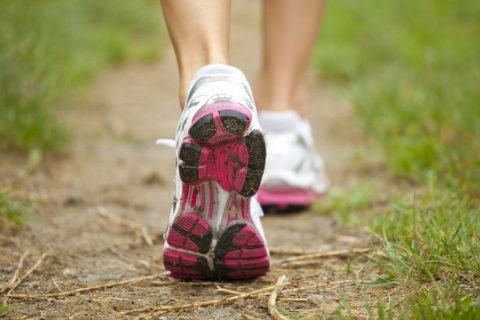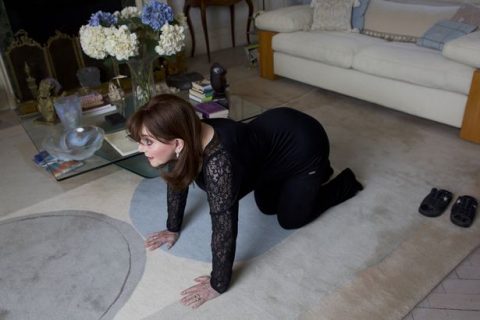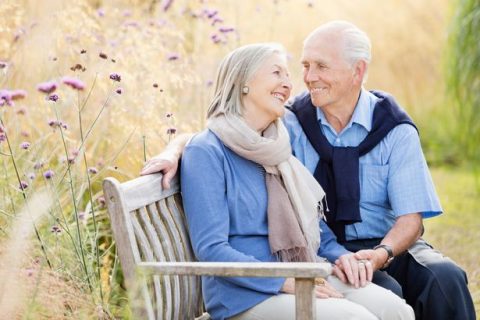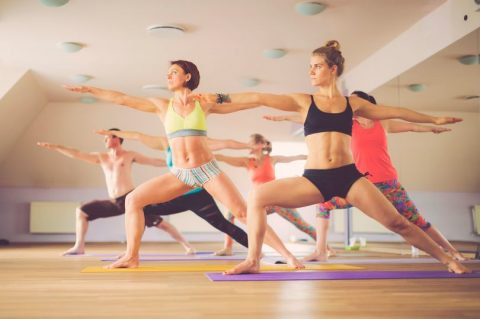Our bodies really hate being inactive. We’ve been running for thousands of years as active hunter-gatherers. Every member of the human race used to exercise every day of their lives.
And the body hasn’t evolved to cope with inactivity – it just hasn’t had time.
Over the millennia, we’ve learnt to cope well with a lack of food – indeed we’ve evolved to withstand starvation – but our bodies have no way of coping with lack of exercise.
These days, many of us lead a primarily sedentary life, and it’s a killer. The body knows of no way to deal with this – all it can do is decay.
Why we need exercise
Inactivity causes problems because our metabolism is geared to use the energy from the food we eat by being agile, mobile, on our feet and moving about most of the time.
Without exercise, all the systems in our body start to age.
It protects you from cancer
Physically active men and women have half the risk of getting colon cancer than their sedentary friends.
The hormones implicated in breast and uterine cancer are modulated by exercise.
Studies show that activity can be responsible for a 30% reduction in breast cancer rates – and the more exercise you take, the greater the protection.

Activity keeps your heart elastic
You never know when you’re going to call on your heart to perform in a superhuman way.
If your heart has been allowed to become slack and fat – as any unfit muscle will – it won’t be able to respond in an emergency.
You may be lucky enough to get a warning sign – the chest pain of angina. But you may not, and you could precipitate a heart attack.
Exercise can make your heart fit enough to pull out the stops and keep your blood pressure low.
Exercise controls your appetite – it does mine
We all have something called the appestat – a switch in the brain telling us we’re full and should stop eating.
Exercise turns it on, and does so for as long as you exercise every day.
This stabilises your blood sugar and stops the development of type 2 diabetes. Exercise makes you listen to your appestat.
But the most subtle effect of exercise is on what it makes you choose to eat.
When I was doing a cycle challenge through Israel, Jordan and Egypt, I found that I automatically reached for oranges, tomatoes (both containing vitamin C) and bread (complex carbohydrate) every time we stopped.
I didn’t want protein, I didn’t want fat, I didn’t want sugar. My muscles were telling my brain what they needed. And my appestat was guiding my hand towards fresh fruit and vegetables.

Tips for starting to take exercise, whatever your age
- If you think you’re unfit, check with your doctor first.
- Choose activities and exercises which you enjoy.
- If you can’t carry on a conversation while exercising, it’s too strenuous.
- The best form of exercise is one that fits in with your daily life, such as taking the dog for a walk.
- Never exercise on a full stomach – always wait at least an hour.
- Go slowly and surely at the start.
- Once you’ve reached your desired level of fitness, try to exercise at least three or four times a week to maintain it.
- Simply increasing the amount of walking you do will increase your fitness.
- The aim isn’t to exercise strenuously three times a week, it’s to exercise gently every day.
Why your thigh muscles are important
Regarding youthfulness and fitness, the most important muscles in your body are your quadriceps, on the front of your thighs. They’re the biggest muscle group in the whole body.
The reason the quads are so crucial for defying age is that you can’t get out of a chair if they’re weak. If you want to resist that classic picture of an older person sitting in an armchair, keep your quads well-toned and strong.
The best way of strengthening your quads is to raise yourself out of any chair relying only on your thigh
muscles – WITHOUT USING YOUR ARMS AND HANDS TO RAISE YOUR LOWER BODY!
That way, you’ll never be left on the sidelines of life.

Exercise keeps your brain young and happy
- New brain cells are formed when we exercise. It’s possible that the increased blood flow carries more growth factors in the brain, stimulating the growth of new cells there.
- Exercise also increases serotonin production – a known trigger for the growth of new brain cells.
- A well-known theory of clinical depression is that it arises from the brain’s failure to grow enough fresh neurones.
- I’m convinced that exercise is the key to a longer life, and if you want some idea of the many benefits of exercise – even moderate amounts – just take a look at this list:
- Growth hormones make new brain cells grow, so cognitive thinking and memory improve.
- Endorphins released give you an eight-hour high.
- Increased adrenaline controls your appetite and stops cravings.
- Exercise hormones treat anxiety and depression, so lessening the need for antidepressants.
- It cures jet lag.
- It’s a treatment for irritable bowel syndrome.
- Combats stress and lowers blood pressure.
- Reshapes your body.
- Changes your eating habits to healthy ones.
- Ankles don’t swell any more.
- Makes you take more exercise.
- Good for migraines, cures headaches.
- Vision gets brighter, can wear contact lenses for longer.
- Better sleep.
- Increases heart/lung efficiency so you can be more active.
- Lowers cholesterol, so fewer heart attacks and strokes.
- Good for bones, so less osteoporosis.
- Skin goes pink because of increased oxygen in every cell in the body.
- Increases suppleness, mobility and stamina.
- Better balance, so fewer falls.

What to remember when taking up walking
Less physical activity is directly related to ageing. But the older you get, the less active you feel because you start to decline in vigour.
But all you have to do is get walking. At the end of four weeks, I guarantee you’ll notice changes in your body and mental wellbeing.
Here are a few things to remember when walking:
- You’re not in a hurry.
- Aim for half an hour at a pace slightly above a stroll.
- If you’ve never exercised before, get checked out by your doctor.
- Always do some bends and stretches before you start to walk.
- To begin with, walk on level ground and avoid hills.
- Always walk “within your breath”. You should be able to converse.
- Never push yourself, never strain yourself. As soon as you feel strain, stop.
- Try to increase the distance you walk, rather than the speed.
- Eventually aim for 5km (3 miles) without stopping in 45-55 minutes.
- Good walking shoes and socks are key.
- Wear loose-fitting layers that you can peel off.
- Walk a minimum of three times a week if possible.
- Build walking into your daily pattern – to the shops, to the station etc.
The benefits of yoga
Yoga’s holistic approach encompasses stretching movements, mental relaxation and deep breathing, which can help to deal with menopausal symptoms very effectively.
It also promotes good posture and mental tranquility, which may alleviate backache, mild depression and sleeping problems.
Yoga can be practised by all, but if you suffer from severe back disorders, dizziness, heart trouble or any other serious medical conditions, it’s wise to consult your doctor before starting.

Guidelines for practising yoga
- Yoga can help to keep you supple, active and young. It’s a moving meditation during which you concentrate on your breathing and focus on repetitions of each movement.
- Try a class to learn what’s involved and then enrol with a teacher.
- Concentrate on breathing – deeply and rhythmically through your nose.
- Some yoga positions can feel uncomfortable at first – try not to force yourself into a difficult position.
- Work slowly at stretching and becoming more supple.
- Hold a posture for as long as it’s comfortable. Aim for 30 seconds to begin with in both standing and sitting postures.
- Wear comfortable, loose clothing and keep your feet bare to stop yourself slipping.
- Don’t practise yoga for at least four hours after a large meal.

